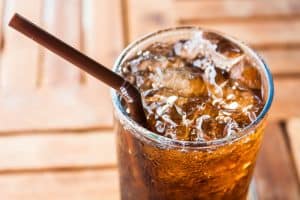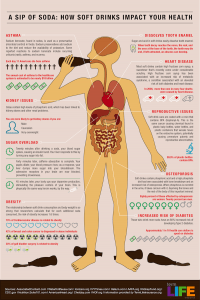Does diet soda help or hurt weight loss?
The recent bans and taxes in liberal cities to paternalistically protect you from the evils of sugar or carbonation are nothing new. The bullseye on soda or carbonated sweetened drinks has been around for a long time and they want you to decrease your consumption. This cause is a new form of prohibition and looks at how that worked for alcohol. For as long as I can remember, folks have been vilifying soft drinks. I can remember adults telling me that soft drinks were terrible for me and that the carbonation would ruin my ability to participate in sports. They said these wild stories as they turned up a gin and tonic or bourbon and seltzer. To me, it just did not make any sense.
In recent years, a lot of research has been done on both sugar-sweetened beverages and artificially sweetened beverages and their suspected ties to obesity and weight gain. It is a controversial subject. There are lots of hidden agendas and vilification of artificial sweeteners. Products with artificial sweeteners in them are often listed as “diet”. The real question to be asked is: does consumption of these products actually help or hurt weight loss?
Seven reasons to avoid or limit soda consumption:
- Soft drinks are terrible for your teeth. Sure, sugar causes tooth disease, but the real culprit in the drink is acid. The phosphoric acid dissolves the enamel right off your teeth with each drink you take.
- Soft drinks are terrible for your bones. Phosphoric acid is terrible for your teeth but is also bad for your bones. The phosphoric acid in soft drinks contains phosphorus which has been associated with osteoporosis. In order to excrete phosphorus in your urine, your body must also excrete calcium at the same time. Over time, this joint excretion leads to bone loss and osteoporosis.
- Soda is empty calories. Whether the soft drinks you consume have fructose or glucose, it is empty calories. You get absolutely no nutritional value other than calories. There is a high correlation between the level of soft drink consumption and the degree of obesity. With each additional soft drink you drink, you are increasing your obesity risk by 1.6 times.
- Soda may increase your risk of heart disease. High fructose corn syrup has been linked to metabolic syndrome. Metabolic syndrome increases your risk of heart disease. In fact, 70% of cardiovascular disease has been linked to obesity.
- Soft drinks may increase your risk for cancer. Over 40% of breast and colon cancer is diagnosed and obese patients. Since soft drinks and high fructose corn syrup increase your risk of metabolic syndrome and obesity, it may also increase your risk for cancer.
- Soda may increase your risk for diabetes type II. Soda increases your risk for metabolic syndrome and obesity which are directly tied to type II diabetes. Those who have high soda consumption have a higher risk of diabetes. In particular, those who drink three or more sodas per day have an 80% increased risk of type II diabetes.
- Soda may reduce your fertility. In males, obesity reduces testosterone levels. If males have less testosterone, they will have reduced sexual function. The soda container may contain BPA which is been tied to infertility.
- Artificial sweeteners may increase hunger. A multitude of studies has shown that artificial sweeteners increase hunger. One study by Blundell looked at appetite and aspartame intake in a test group of 95 volunteers and found that it might increase hunger and that this effect may be tied to hydration[1]. Tordoff found that not only did the sweetness of aspartame and saccharin increase hunger but it resulted in a higher calorie consumption[2],[3],[4]. The sweetness stimulating of hunger is not just tied to aspartame but rather it appears to be tied to most of the artificial sweeteners (acesulfame-K, Saccharin) that have been tested[5]. Other studies by Blundell looked at uncoupling the sweetness by removing taste and found that aspartame may inhibit hunger if the subjects do not taste the sweet flavor[6],[7],[8],[9],[10]. There has been a lot of research on this topic, but it is not conclusive. Several studies disagree. In particular, studies from 1994 and 2014, concluded that artificial sweeteners did not increase appetite and in particular, the one from 1994 said aspartame decreases appetitie[11],[12].
- Artificial sweeteners may increase food intake. As listed above, artificial sweeteners may increase appetite. It makes sense that they would also increase food intake. The research backs up this claim. I’ve already indicated this with one study by Tordoff[13]. Another study by Tordoff from Appetite in 1988 also shows this effect in rats. The rats were given water sweetened with saccharin or just plain water and the group that was given the sweetened water ate more and gained weight[14]. Another study by Stellman looked at women over a 1-year period was examined in a highly homogeneous group of 78,694 women ages 50-69 enrolled in a prospective mortality study. Artificial sweetener usage increased with relative weight and decreased with age. Users were significantly more likely than nonusers to gain weight, regardless of initial weight. Average weight gains or losses by artificial sweetener users differed by less than 2 pounds from gains or losses among nonusers[15].
- Diet drinks may not help with weight loss. Weight loss requires that you take in fewer calories than you burn. It would make sense that diet soda and artificially sweetened foods would decrease weight or assist in weight loss. This assumes that the individual does not compensate by increasing their food intake.
- Diet drinks may increase your waistline. There is a great study that was published in 2015 that looked at elderly Hispanics in San Antonio. The San Antonio Longitudinal Study of Aging, or SALSA study found that the waist circumference increased 70% more in the group that drank diet soda than the group that did not. The worst part is that this seems to be dose-dependent because if they had two to or more diet drinks per day, the increase was over 500%[16].
- Drink more water. Water is what your body needs to function. You do not need diet soda or any soda for that matter. A very good study illustrates that water consumption increases weight loss in overweight dieting women[17]. This no reason o believe this is restricted to single-gender. For more research on water, read Research Proven Weight Loss: Drink Water.
- Drink coffee or unsweetened black or green tea. If you need a pick me up, choose a better beverage. There are several articles to back this up on my site with accompanying research. For more information, read Research Proven Weight Loss: Green Tea or Research Proven Weight Loss: Coffee.
- Use artificial sweeteners in moderation. The nostalgia of fountain drinks was a treat during our childhood and now we are in the land of plenty and supersized drinks. Soft drinks have become an everyday “treat”. We need to get back to the past. Artificial sweeteners are not a panacea. With the increasing evidence that soda may increase your appetite, you should use them very sparingly. If your choice is between having a high fructose corn syrup (HFCS) filled regular soda and a diet soda, you should probably choose the latter. There are plenty of studies that illustrate that HFCS is terrible for you and likely increases fat storage[18],[19]. It does not matter whether there is increased fat storage with HFCS over other forms of sugar or just the fact that we take more in today than we did 50 years ago. The answer is the same and HFCS-sweetened drinks are empty calories and you should eat your calories and not drink them.
-
Blundell, JE, and SM Green. “Effect of Sucrose and Sweeteners on Appetite and Energy Intake.” International Journal of Obesity and Related Metabolic Disorders : Journal of the International Association for the Study of Obesity 20 Suppl 2 (March 1, 1996): S12-7. [PubMed]
-
Blundell, JE, and AJ Hill. “Paradoxical Effects of an Intense Sweetener (Aspartame) on Appetite.” Lancet (London, England) 1, no. 8489 (May 10, 1986): 1092–93. [PubMed]
-
Blundell, JE, PJ Rogers, and AJ Hill. “Uncoupling Sweetness and Calories: Methodological Aspects of Laboratory Studies on Appetite Control.” Appetite 11 Suppl 1 (January 1, 1988): 54–61. [PubMed]
-
Bocarsly, ME, ES Powell, NM Avena, and BG Hoebel. “High-Fructose Corn Syrup Causes Characteristics of Obesity in Rats: Increased Body Weight, Body Fat and Triglyceride Levels.” Pharmacology, Biochemistry, and Behavior 97, no. 1 (November 1, 2010): 101–6. [PubMed]
-
Bray, GA, SJ Nielsen, and BM Popkin. “Consumption of High-Fructose Corn Syrup in Beverages May Play a Role in the Epidemic of Obesity.” The American Journal of Clinical Nutrition 79, no. 4 (April 1, 2004): 537–43. [PubMed]
-
Bryant, CE, LK Wasse, N Astbury, G Nandra, and JT McLaughlin. “Non-Nutritive Sweeteners: No Class Effect on the Glycaemic or Appetite Responses to Ingested Glucose.” European Journal of Clinical Nutrition 68, no. 5 (May 1, 2014): 629–31. [PubMed]
-
Fowler, Sharon P.G., Ken Williams, and Helen P. Hazuda. “Diet Soda Intake Is Associated with Long-Term Increases in Waist Circumference in a Biethnic Cohort of Older Adults: The San Antonio Longitudinal Study of Aging.” Journal of the American Geriatrics Society. Wiley-Blackwell, March 17, 2015. doi: 10.1111/jgs.13376
-
Rogers, PJ, and JE Blundell. “Reanalysis of the Effects of Phenylalanine, Alanine, and Aspartame on Food Intake in Human Subjects.” Physiology & Behavior 56, no. 2 (August 1, 1994): 247–50. [PubMed]
-
———. “Separating the Actions of Sweetness and Calories: Effects of Saccharin and Carbohydrates on Hunger and Food Intake in Human Subjects.” Physiology & Behavior 45, no. 6 (June 1, 1989): 1093–99. [PubMed]
-
Rogers, PJ, JA Carlyle, AJ Hill, and JE Blundell. “Uncoupling Sweet Taste and Calories: Comparison of the Effects of Glucose and Three Intense Sweeteners on Hunger and Food Intake.” Physiology & Behavior 43, no. 5 (January 1, 1988): 547–52. [PubMed]
-
Rogers, PJ, HC Pleming, and JE Blundell. “Aspartame Ingested without Tasting Inhibits Hunger and Food Intake.” Physiology & Behavior 47, no. 6 (June 1, 1990): 1239–43. [PubMed]
-
Stellman, SD, and L Garfinkel. “Artificial Sweetener Use and One-Year Weight Change among Women.” Preventive Medicine 15, no. 2 (March 1, 1986): 195–202. [PubMed]
-
Stookey, Jodi D., Florence Constant, Barry M. Popkin, and Christopher D. Gardner. “Drinking Water Is Associated With Weight Loss in Overweight Dieting Women Independent of Diet and Activity.” Obesity. Wiley-Blackwell, November 2008. doi: 10.1038/oby.2008.409
-
Tordoff, MG. “How Do Non-Nutritive Sweeteners Increase Food Intake?” Appetite 11 Suppl 1 (January 1, 1988): 5–11. [PubMed]
-
Tordoff, MG, and AM Alleva. “Oral Stimulation with Aspartame Increases Hunger.” Physiology & Behavior 47, no. 3 (March 1, 1990): 555–59. [PubMed]
-
Tordoff, MG, and MI Friedman. “Drinking Saccharin Increases Food Intake and Preference–I. Comparison with Other Drinks.” Appetite 12, no. 1 (February 1, 1989): 1–10. [PubMed]
-
———. “Drinking Saccharin Increases Food Intake and Preference–II. Hydrational Factors.” Appetite 12, no. 1 (February 1, 1989): 11–21. [PubMed]
Ok, that is enough vilification of soda. You get the point, soft drinks should be limited. Some of these concerns can be reduced with artificial sweeteners. We all know we should drink more water and less soda and that artificially sweetened or diet soda has fewer calories than soda sweetened with sugar, but does diet soda hurt or help weight loss?
Research on weight loss and soda consumption:
The problem with most studies on artificial sweeteners is that we do not know the actual cause and often the interpretation by the press infers that diet drinks are the cause. This is the old “chicken or the egg” conundrum. What do I mean by that? It is true that people that use aspartame are more likely to gain weight. It is true that people who use aspartame or more likely to be overweight and obese. The question is: does aspartame cause weight gain and increase hunger or are people who tend to turn to aspartame to decrease the sugar intake more likely to overeat or be overweight? The answer to this question is not clear, but I would say that diet soda does not hurt or help weight loss but you should reduce your consumption.
Recommendations on Diet Soda and Artificial Sweeteners:
The bottom line: Soda in moderation can be a healthy part of any diet. Enjoy!











Be the first to comment on "Weight Loss Research: Diet Soda"